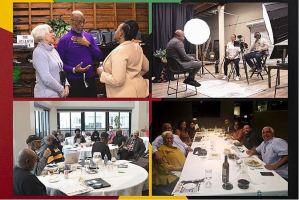By Liz Dwyer, managing director of Word In Black
When I talk to the 10 publishers that are a part of Word In Black, I often find myself thinking about how they’re the modern-day descendants of Ida B. Wells. Not because they walk around, as Wells had to, with two pistols to protect themselves from anti-Black violence. (At least, I don’t think they’re doing that!)

No, they remind me of Wells because of their deep connection to, and love for, the Black community — because our publishers are the Black community. Their commitment to truth and justice also reminds me of what Wells once said about why journalism matters: “The people must know before they can act, and there is no educator to compare with the press.”
Spend some time with Denise Rolark Barnes, the publisher of The Washington Informer, and you’ll understand what I mean. She wrote an op-ed last fall for Word In Black about water scarcity — all because a woman from her community in Washington, D.C., came into her office and had a conversation with her about it. Rolark Barnes’ words served as a means to educate the Black community about the clean water crisis, and help folks start to think about what they can do about it.
Then there’s Dr. Toni Draper, the publisher of the AFRO American Newspapers. This month she quickly connected Word In Black to Dr. David K. Wilson, the president of Morgan State University, a public, historically Black research university with more than 8,000 students in Baltimore, Maryland. Dr. Wilson wrote a powerful op-ed for Word In Black contextualizing the bomb threats against Historically Black Colleges and Universities, and made it clear that nothing will stop these schools from fulfilling their mission. He wasn’t writing as an outsider. Dr. Wilson attended an HBCU himself, and is living these threats with his students and staff, and their families.
And I think of Janis Ware, the publisher of The Atlanta Voice. She wrote a recent call to action about voting and broke down for Word In Black readers how “the right to vote comes with the blood of our ancestors.” Ware shared with readers how a favorite hymnal she grew up singing in her Baptist church “speaks of rejoicing, singing, and shouting for victory.” And, she wrote, “In a way, voting is victory.”
There’s unapologetic Blackness in the way they write, the stories they tell, and the information they share. They’re having a conversation with their community, and this is true for all 10 of Word In Black’s publishers.
Bonus: They don’t have to apologize for anti-Black reporting or ask, as The Philadelphia Inquirer recently did, whether, “after perpetuating inequality for generations, can The Inquirer really become an anti-racist institution?”
As journalist Wesley Lowery wrote in “Black City, White Paper,” his examination of efforts to rectify that paper’s racist reporting: “Rather than being an ‘inquirer for all,’ as its motto proudly claims, the paper has for the whole of its history been written largely for and by white Philadelphians, and largely at the expense of the Black residents who currently constitute a plurality of the city,”
What Lowery wrote could be said of every mainstream paper that used the word “looters” to describe Black people trying to survive after Hurricane Katrina, or used the word “rioters” to describe Black people speaking up and protesting police violence after George Floyd’s murder in 2020.
Ida B. Wells’ groundbreaking reporting on lynching and other racial injustices changed America – and made her one of the most famous Black women of her time. She’s celebrated now — she’s so celebrated, she even has a Barbie! Yet, her death in 1931 was not reported in the nation’s paper of record, The New York Times.
The Times didn’t run an obituary for Wells until 2018, with its “Overlooked” series for people who weren’t the prominent white male leaders traditionally covered by the paper.
You’d better believe Black publishers didn’t have to decide, 87 years after Wells’ passing, that she finally mattered enough to be lauded.
Perhaps you could say the Black press is ahead of the mainstream press in the way it reports local news, the way it talks about racism and other forms of injustice, and the way it reports about Black folks.
We don’t have to wait a century to recognize the publishers who are a part of Word In Black for their truth telling. We can learn from their impact and influence, and give them their flowers now for being leaders and crusaders for justice, 21st Century-style. And we don’t have to wait to amplify their reporting on Black individuals, organizations, businesses, and communities. The Black press is the original. They’ve been doing this work since Day One.
Help us Continue to tell OUR Story and join the AFRO family as a member – subscribers are now members! Join here!
The post How the Black press tells the truth mainstream media have only begun to acknowledge appeared first on AFRO American Newspapers .











